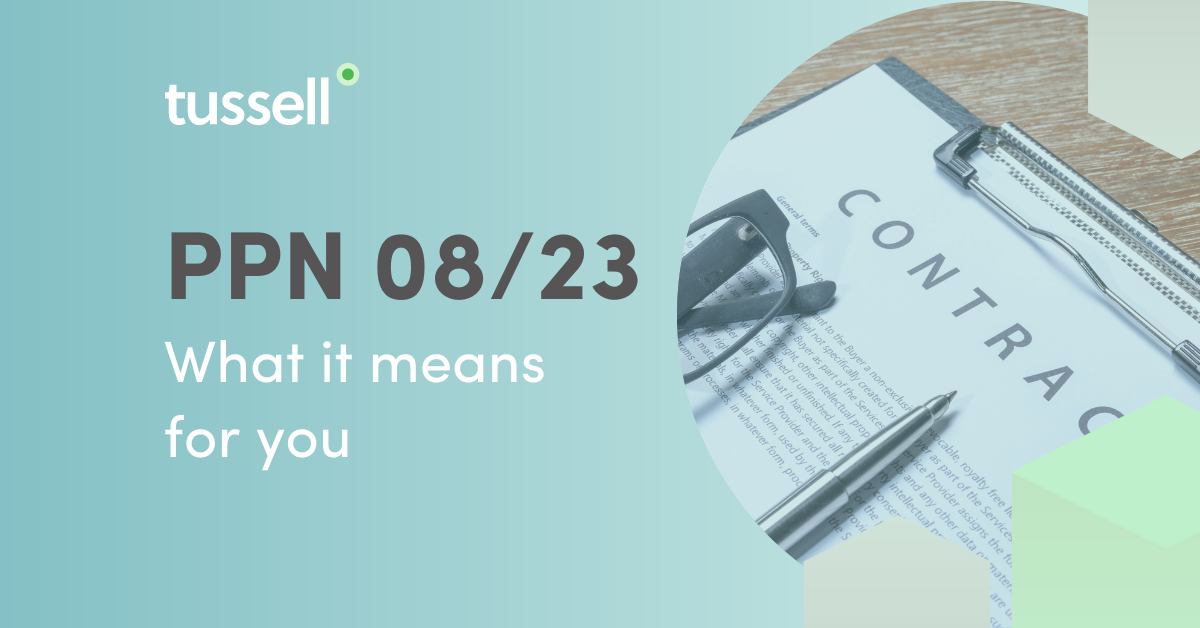At the start of August 2023, the Cabinet Office published PPN 08/23: Using Standard Contracts.
This PPN mandates important changes to how Central Government departments conduct procurement outside of framework agreements.
In this quick-fire blog, we've summarised what this important PPN is enforcing, and what it means for procurement professionals across the public sector.
💡 PPN 08/23: what's new?
PPN 08/23 requires that when Central Government departments (inc. their Executive Agencies & Non-Departmental Public Bodies) are looking to procure outside a framework agreement, they must do so via one of three 'Standard Contracts'.
The 3 Standard Contracts
The Model Services Contract (MSC)
MSCs are designed for "complex services procurements" which will involve some kind of formal negotiation with potential suppliers (e.g. clarifying scope or clarifying the scope of existing arrangements)
As such, MSCs are particularly suited for BPO or ICT services contracts.
Using an MSC is encouraged for contracts with an estimated lifetime value above £20mn.
For more information, click here.
The Mid-Tier Contract
Mid-Tier Contracts are intended for contracts that are relatively straightforward, and will unlikely require formal negotiations with potential suppliers.
Mid-Tier Contracts may be used for contracts that are above the relevant threshold value, but below £20mn in estimated lifetime value.
For more information, click here.
The Short Form Contract
Short Form Contracts are designed for low value goods and services procurements.
Short Form Contracts are intended for procurements that will likely fall below the relevant threshold value (unless the procurement is relatively complex, in which case a Mid-Tier Contract should be used)
For more information, click here.
The Cabinet Office recommends that "appropriate legal advice" is used to determine which Standard Contracts are applicable in what instances.
The Standard Contracts should only be utilised when a "more suitable form of contract" is not available (namely, procurement via a framework agreement or DPS)
The use of the Standard Contracts should start "as soon as practicable". The Cabinet Office is aware, however, that the changes it sets out are quite substantive, and that different procurement teams have varying capacities to adopt these changes promptly.
❓ Why is this PPN being introduced?
PPN 08/23 looks to notify Central Government contracting authorities of the recommendations made in the Cabinet Office's recently updated Sourcing Playbook.
The Sourcing Playbook argues that Central Government bodies should, by default, procure standard goods and services through framework agreements. Where this is not possible, the Standard Contracts should be used instead.
Using this approach, argues the Playbook, means Departments avoid creating bespoke contracts for each procurement process. This can "increase negotiation and resource time", "risks Departments reinventing contracts that otherwise exist", and increases the chances of "inconsistent policy positions".
The Standard Contracts aim to rectify this by providing a suite of pre-designed, standardized contracts.
🧠 What does this PPN mean for public bodies outside Central Government?
Though use of the Standard Contracts is mandated only for Central Government contracting authorities, the PPN does encourage all contracting authorities to consider using them.
The Cabinet Office argues that using the Standard Contracts aim to "reduce administration, resource (including legal) costs and negotiation time, and aid consistency and compliance with relevant legislation and procurement policy".
We frequently hear from our public sector Tussell users how burdensome and time-consuming running new procurement processes can be. Using the Standard Contracts when applicable may help to rectify needlessly recreating the wheel.
*
PPN 08/23 mandates some pretty substantial changes to how Central Government departments should conduct their procurement going forward.
If you're part of a Central Government commercial and procurement team, it's crucial that you understand when to use each of the 3 Standard Contracts. More resources on each of the Standard Contracts can be found here:
PPN 08/23 and the Standard Contracts ultimately aim to save procurement teams time and money.
The Tussell platform also helps contracting authorities to do this. It does this by providing procurement teams with the data they need to make more informed procurement decisions, find opportunities for joint procurement, , and better understand potential suppliers' public sector footprint.
To see how Tussell can help your team do all this and more, book in a personalised tour around the platform.
To get these summarises - and lots more guides, explainers & analysis just for public sector procurement professionals - sent straight to your inbox, sign up for our newsletter.
All of our past PPN explainers are linked below:
- PPN 07/23: Government Security Classifications Policy 2023
- PPN 05/23: Implementing new Free Trade Agreements
- PPN 01/23: Requirements to publish on Contracts Finder
- PPN 08/21: Taking account of a bidder's approach to payment in the procurement of major government contracts
- PPN 06/21: Taking account of Carbon Reduction Plans in the procurement of major government contracts
- PPN 05/21: National Procurement Policy Statement



%20v1.png)
![New Nav Bar - New Tag [Gov]](https://www.tussell.com/hubfs/New%20Nav%20Bar%20-%20New%20Tag%20%5BGov%5D.png)
![[Gov] New Nav CTA - Product, Frameworks Finder (rounded) v1](https://www.tussell.com/hubfs/%5BGov%5D%20New%20Nav%20CTA%20-%20Product%2c%20Frameworks%20Finder%20(rounded)%20v1.png)


.png?width=80&height=80&name=james%20v2%20(1).png)

![New Nav Bar, Insights - Strategic Suppliers 2025 [Gov] v2](https://www.tussell.com/hs-fs/hubfs/New%20Nav%20Bar%2c%20Insights%20-%20Strategic%20Suppliers%202025%20%5BGov%5D%20v2.png?width=600&height=600&name=New%20Nav%20Bar%2c%20Insights%20-%20Strategic%20Suppliers%202025%20%5BGov%5D%20v2.png)




